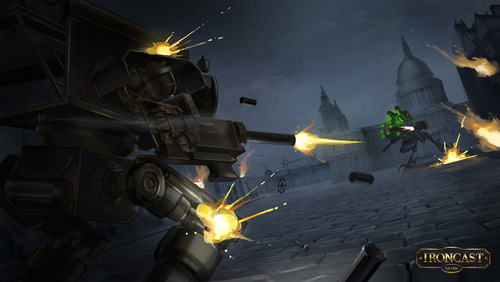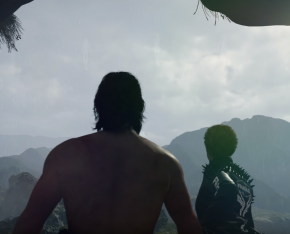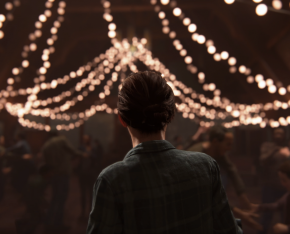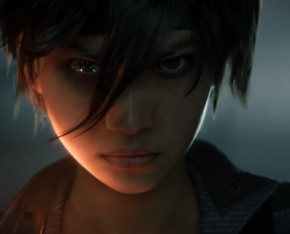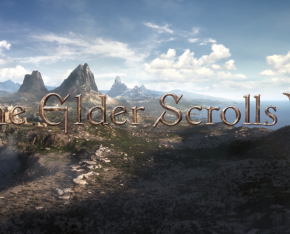By Andrew Dodson on September 3, 2014 at 11:10am
In this day and age, I'd say you'd be hard-pressed to find a gamer that hasn't played some sort of mech game. There are tons of games where you're a lone pilot in a cockpit, controlling a 100 ton bi-pedal killing machine, equipped with every manner of missile, gun and laser. When I first clicked on the link for Ironcast, I was expecting another game like that - first-person, in a cockpit and stomping around shooting bad guys.
"Ironcast" takes the mech concept and does something different with it. You're still in control of a 100-ton bi-pedal killing machine, sure, but your perspective is now outside of the machine. Also, the game is turn-based, making battles more about strategy rather than who can shoot the hardest and the fastest. Also, in order to make your Ironcast do the things it needs to do, there is a colorful node system that you have to master - matching up linked power nodes to raise shields, fire guns, move or stop the train-like machine from overheating. The node system simulates using a new power source called "Voltite" which fuel the ironcasts.
I suppose it should also be mentioned that "Ironcast" does not take place on Mars or in some super-advanced cyberpunk setting. It takes plays in London. Victorian-era London. A steampunk, Victorian-era London. And you're not fighting aliens. You're fighting the French, who are also equipped with huge ironcast-mechs of their very own.
Player Theory got the chance to talk to Daniel Leaver, the lead designer for "Ironcast," and learn a thing or two about this brand-new Kickstarter project:
Player Theory: You've worked on some pretty big-name games - the "LittleBigPlanet" series and "Tearaway." How is the development process different this time around working with much smaller team?
Daniel Leaver: It's a lot faster being part of a tiny team. Media Molecule actually has one of the fastest and flexible iteration processes of any studio, where a feature can go from concept to playable inside of a day easily. They're pretty small for a AAA studio, at only about 50 people. However, there's always got to be a review process and audit of ideas at some point, and these can be time consuming to say the least. In a team of 2 or 3, that review process is a 10-minute catch up every morning to get everyone in sync! It feels like we're on fire at the moment with no signs of slowing down.
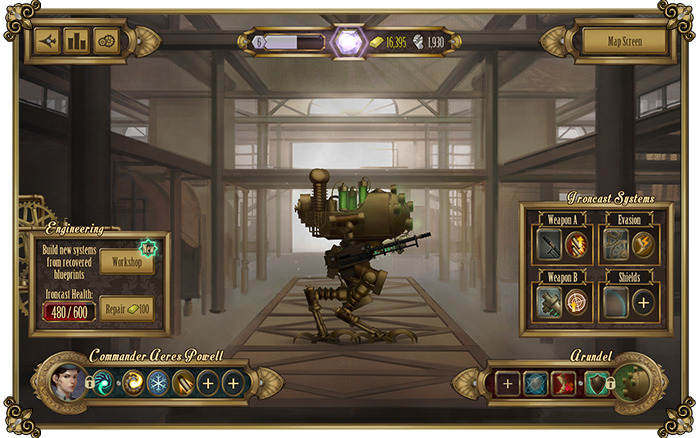
PT: You're making Ironcast with only two other developers. How did you choose them to be a part of the team? Was there a process?
DL: Chris Butler and I have actually worked together previously, so he was a really easy choice. I love working with him as he's able to take a design I've proposed and just run with it. The idea is nearly always better in reality than design due to some magical extra twist or flourish Chris has added (or the removal of some flaw I'd not yet seen!). What's more, he plays a lot of the same games that I do, so ideas are very easy to convey to him.
Amber I found by making an advert post on CGHub (which sadly and suddenly shut down a few months ago!). She responded and I was blown away by the quality and variety of her artwork. I knew that the lead artist would be drawing everything from GUI, to mechs, to characters to icons, so they needed that flexibility to go with the talent. Amber has both in droves.
PT: On the topic of the "smaller team," you also created your own studio, Dreadbit, to tackle Ironcast with. Is this your first time at running a studio on your own? Is the experience different than you imagined it to be? I know Dreadbit is still in its infancy a little bit, but do you have any advice for other people that are thinking about creating their own development studio?
DL: No, this is actually my 2nd attempt! I co-founded Ambient Studios 2 years ago with several other Media Molecule developers. It was amazing fun and a very good learning experience. We actually attempted a Kickstarter for a title called "Death Inc" which raised £125k! Sadly, this was only 40% of the goal, so obviously we didn't get a penny. Ultimately, we realised that running Ambient with 11 full-time staff with no money coming in was unfeasible and closed down 18 months later.
Dreadbit is in many ways the total opposite to Ambient; there are no full-time employees, no studio and very few overheads. Instead, we pull together the team we need on a per project basis and work remotely. Importantly, each project is a pitch to my trusted developer friends; If they can get behind the idea, then it deserves to be made. If not, then we come up with another! There's no compromise due to just needing to keep the lights on. It's really refreshing!
PT: When you start working out the idea for a game, what comes first: mechanics/gameplay or the story/flavor of the game? Or is there something else?
DL: I tend to daydream a lot to entertain myself as I walk around, attempting to avoid being an actual responsible adult. Sometimes, a daydream will stick in the mind as a really strong image; steampunk mechs, for example. "Wouldn't it be cool to watch giant walking steam trains firing missiles and lasers at each other!" my brain will say to me.
I picture the particle effects, the screenshake, the debris, the sounds. Everything else tends to stem from a scene I can picture in my mind.
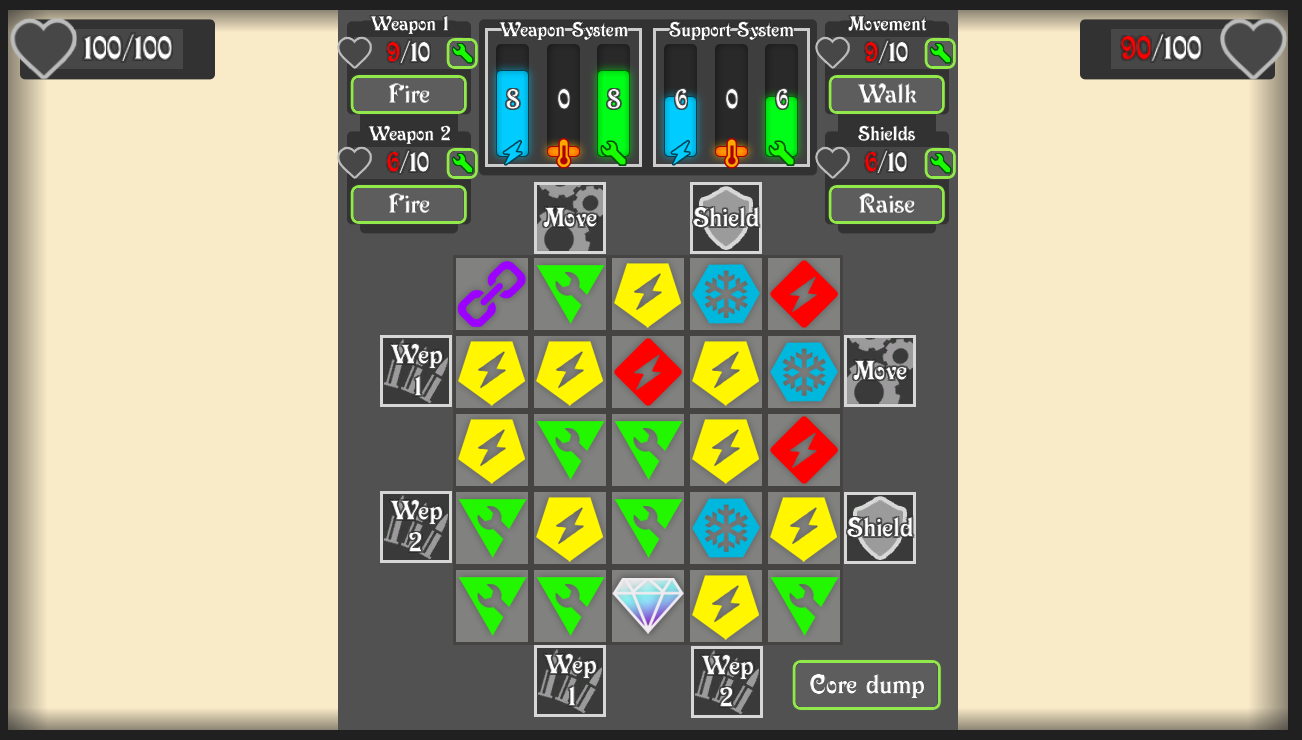
PT: Ironcast is a really unique take on the "mechs-blowing-eachother-up-in-epic-battles" genre. Where did the idea for Ironcast come from? Did that idea change at all once the team got assembled and you began the development process?
DL: When we started, the game was very similar to how it seems now. The team got together over a couple of weekends and had a game jam of sorts, to get a working prototype together. However, the matching mechanic was unnecessarily complex.
(Below is a gameplay prototype for the node system in Ironcast)
You would initially match the coloured gems to the required system icons that surrounded the grid, but what was intended to be an addictive, smooth flowing section of gameplay was in reality more like a chore. We'd tried to reinvent the wheel and over-thought the issue.
Soon after we'd cut the design back and streamlined and what we were left with is something more like the game you see today.
PT: On that topic, the Voltite node system you've created for controlling the Ironcasts is really interesting and seems really satisfying to use. Where did the idea for this mechanic come from, or was it always a part of the plan? I also have a gameplay question regarding the node system: Are the nodes that drop down completely random, or is there a pattern of some kind? Does the Ironcast that the player is using have any effect on the types of nodes that drop down?
DL: It is really satisfying! I'm genuinely enthusiastic about the mechanic. It's a lighter way of getting some skill into a game about tactics, where the player improves their eye for matches and getting the most efficiency out of their grid each turn. The more nodes you match, the more actions your Ironcast can perform each turn (like shielding yourself or firing weapons). The longer the match chain, the more XP you earn too, allowing you to unlock new active and passive abilities faster!
In all honesty I have to say the matching mechanic comes from similar games such as Puzzle Quest and Dungeon Raid. I love these games so much and I find there's not enough games that mix the complexity of strategy with the sheer addictiveness of matching colours and spotting patterns. Why not address that issue ourselves!
The nodes that drop are completely random, but in true RPG/Roguelike, the player can equip passive modifiers that increase the chances of certain nodes appearing. In addition, the Commander character chosen affects what happens when you match certain nodes. There should be unlimited combinations of Commander, Ironcast and passive modifiers to try out.
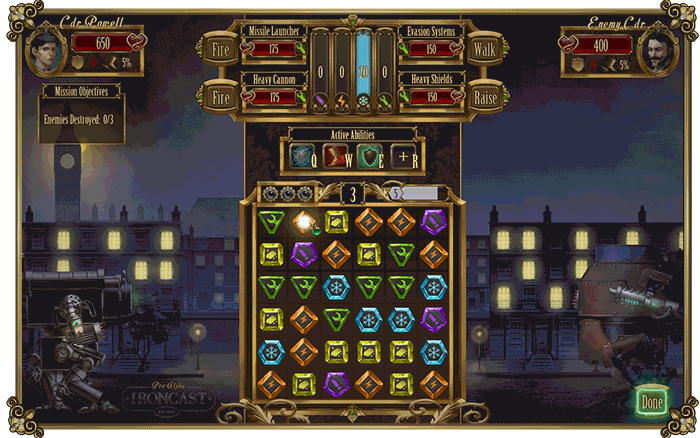
PT: One of my favorite things about Ironcast so far, is how much character the mechs have. Amber Jones (is her middle name really "Blade?") is your artist for this endeavor. Did you work with her on making the designs or did she have free reign to create these fantastic machines?
DL: Her middle name is indeed Blade, which is a huge part of why we hired her (not really!). Her mother is Native American, so she has what she'd refer to as a pretty average first name and an awesome middle name. Her sisters are called Autumn Ray and Avalon Nova. What a cool family!
Amber had complete reign on the mech design. I simply described how I saw them as enthusiastically and accurately as I could; they're hulking, awkward machines built out of necessity. They are pure function over form, to address the very real invading threat. I also wanted a certain oddness about them that would stand-out against the current trend of mechs being super slick Transformer style robots. Finally, we also looked at manufacturing processes available to the people of 1880's England, which is actually why the game is called Ironcast; most mech parts are made through the cast Iron process!
She took this info away and sketched about 20 different designs with the 3 you see in the Kickstarter being the first batch. She's an incredibly creative person.
PT: Is there be any potential for players to play as the French in Ironcast? Or any other countries involved in the game's conflict?
DL: We certainly want the campaign from the French point of view to be an expansion or add-on of some kind. It's a lot of work to create a campaign so it'll not be anywhere near the launch of the game. In addition, one of my best friends is French so I also owe it to him to do a French campaign justice!
One thing that's not clear from the Kickstarter story info is why the French are attacking. The English actually stole the Voltite technology from them a decade earlier and caused an awful lot of civilian casualties as a result, so it's not a clear-cut situation. There are no good guys or bad guys, it's all propaganda.
PT: The Kickstarter for Ironcast just started, and currently, you're just short of 30% of your goal. Is this your first time being a part of a Kickstarter project? How do you feel about your funding level right now? Have you had any feedback from backers yet?
DL: Currently, we're actually over 36% of our goal! That should give you an idea of the rate things are moving right now. (Writer's Note: Right now, "Ironcast" is sitting at just under 39%. This interview took place over email and over the course of just a few hours, which really shows how quickly it is getting funded!) The vast majority of this backing has come from word of mouth and twitter so far, so that's really inspiring!
People seem to love the concept, so the main piece of feedback is actually regarding our pledge tiers and why there's nothing between £30 and £500. Apparently people want to give us more money than we anticipated, so we'll have to remedy this with a £40 or £50 tier soon enough! In the end it all came down to a resistance to physical rewards. We ran this Kickstarter in order to make a game efficiently, with a small team. Having to dedicate even one day to producing or processing physical items seemed counter productive to that aim. We'll work something else out though, don't worry.
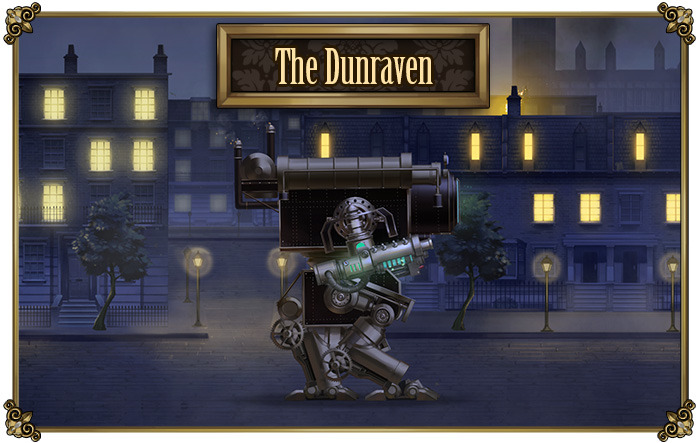
PT: Based on what is currently available, which is your favorite Ironcast and why?
DL: The Dunraven. It's the one we created for our prototype and is affectionately known as "the train mech" internally. Incidentally, each Ironcast is named after a British castle, as were some 19th century steam trains.

PT: The highest pledge level award is a steampunk jetpack. How did you get a steampunk jetpack?
DL: Dave Crook (Kruki99), the creator of the jetpack, has been in the videogames industry as an artist for more than 20 years, but in more recent years has moved into film and television prop making. He's incredibly into steampunk so seemed like the perfect guy to hit up for the reward tier. We settled on the jetpack as it felt like the perfect means of escape for a Commander inside their doomed Ironcast. I can just see it now; the hatch blowing off and them shooting into the sky with a burst of jetpack exhaust. I hope someone goes for the reward tier because it's just awesome!
You can see more of Dave's work here.
"Ironcast" is currently on Kickstarter and is looking beautiful. Given the game is successfully funded, backers should have a copy of "Ironcast" by December of this year!
Ironcast Kickstarter Dreadbit Studios Dreadbit on Twitter Dreadbit on Facebook
